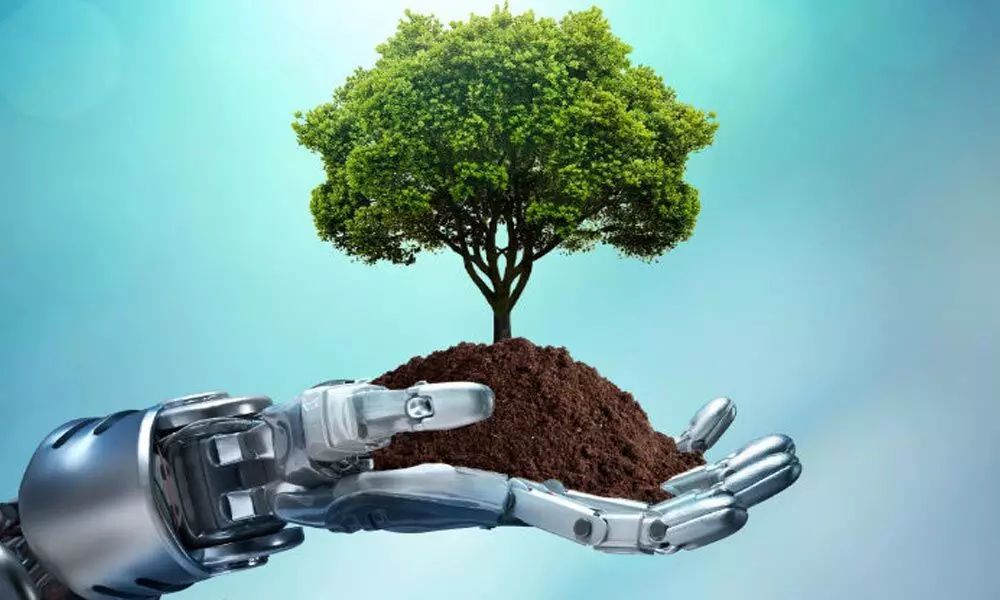How technology can save our planet from dying a slow death
To look at the other end of the continuum, technology can help us reimagine and drastically reorient production altogether
image for illustrative purpose

Sustainability has to certainly invest in eco-friendly practices, building a circular economy and providing dignified livelihoods across the social spectrum and all of this can be accomplished with appropriate harnessing of technology by actors in most direct ways
The term 'sustainability' has found widespread currency in discussions on issues ranging from trade and industrial production to poverty reduction and welfare. However, it is much more than a buzz word, it is the very foundation of our well-being. Among its three core pillars, economic and social development are spoken of generally as immediate, everyday concerns and environmental protection is perceived as a distinct, macro category of its own. This false separation has to be remedied - the economy cannot function without the environmental system being conducive to it, nor can social stability premise itself upon a disregard for the environment. Thus, as we keep on bolstering economic and social impact through technology, technological capability must also be committed to the expansion and sustenance of environmental protection. In fact, technological interventions in tandem with the overall project of sustainable development can revolutionize the domain with increasingly effective solutions to meet sustainability goals.
Technological innovation, when seen from the perspective of sustainability remains an underexplored arena. A report by Autodesk and Frost & Sullivan noted that while government-led sustainability initiatives have gathered pace in India, digital adoption being a critical enabler for sustainability is significantly underleveraged in the country. This is where initiatives and strategies which work directly with concerned populations and areas of conception, design and production can prove to be extraordinary. Sustainability has to certainly invest in eco-friendly practices, building a circular economy and providing dignified livelihoods across the social spectrum and all of this can be accomplished with appropriate harnessing of technology by actors in most direct ways.
To think of something as essential and fundamental as dealing with waste, a digital apparatus can make it easy to track and monitor waste aggregation and management. For example, a smart bin that uses Artificial Intelligence to sort and compress recyclables automatically and process data can be of gargantuan impact in a country like India. Not only can such an intervention lower waste management costs drastically but also tackle the country's waste problem head-on. The usage of sustainable technology also means new economic opportunities and avenues for employment in manufacturing and operation. Governments and non-governmental actors engaging in such manoeuvres can cause the revolution we have always aspired to create.
To look at the other end of the continuum, technology can help us reimagine and drastically reorient production altogether. As Pete Seeger, folk singer and social activist prominently remarked, "If it can't be reduced, reused, repaired, rebuilt, refurbished, refinished, resold, recycled, or composted, then it should be restricted, designed or removed from production." Green technology can transform product design by ensuring production without the use of toxic materials or scarce resources. This overturns the value chain and the market itself, as this strategy is based on coordination at all levels, from processing to manufacturing to recycling. These products necessitate more environmentally sensitive business models, which do not merely base themselves on considerations of profit and loss but on impact. This series of changes can catalyze a chain reaction which can transform the market itself, leading to windows for new opportunities and more conscious transactions.
Another crucial domain, that of spreading awareness, can find a new, incredible lease of life through technology. Community engagement programmes and awareness drives can enjoy an unlimited reach with social media promotion and technology-driven advertising. The tremendous outreach of the #BeatPlasticPollution campaign by the United Nations, which gave consumers 24 hours to tell the world how they were going to #BeatPlasticPollution and tag a friend to get involved provides exemplification. Since the internet is a domain which is widely accessible, all participatory deficits can be rectified.
Technological advancement can create in its wake, a virtuous cycle of environmentally sustainable and substantial economic growth which bridges disparities. Sustainability-centered utilizations of technology in this regard push the envelope for technological capabilities to create a better world while actualizing cleaner and ethical production, judicious resource management, reductions in waste and pollution and economic strides and dignity for everyone involved in the process. It is time to unleash a new torpedo of prosperity, and technology can take us gloriously closer to a fuller realization of sustainability.
(The author is Chief Impact Officer at Recykal Foundation)
Sustainability can't be like some sort of a moral sacrifice or political dilemma or a philanthropic cause. It has to be a design challenge -Bjarke Ingels

